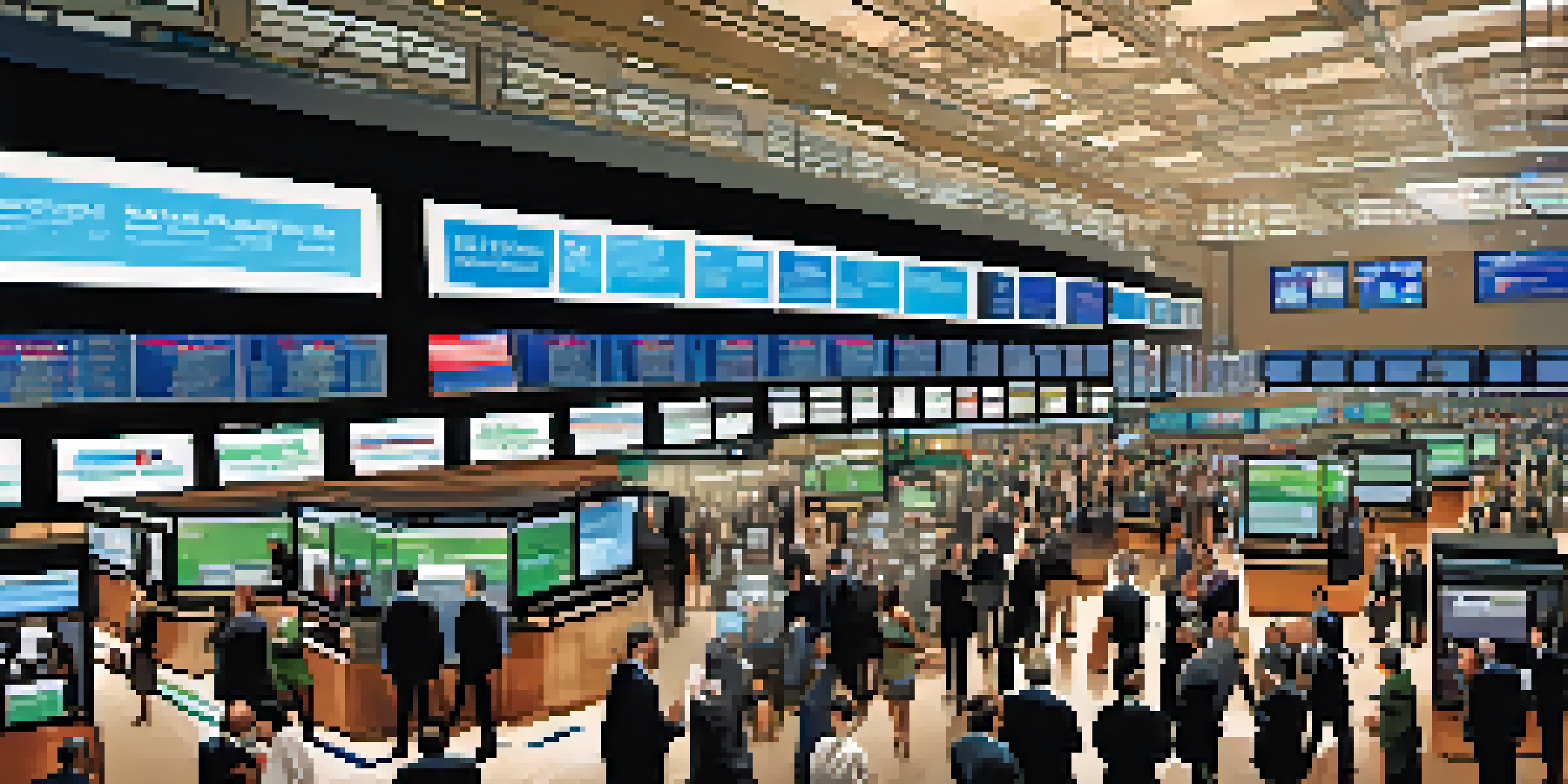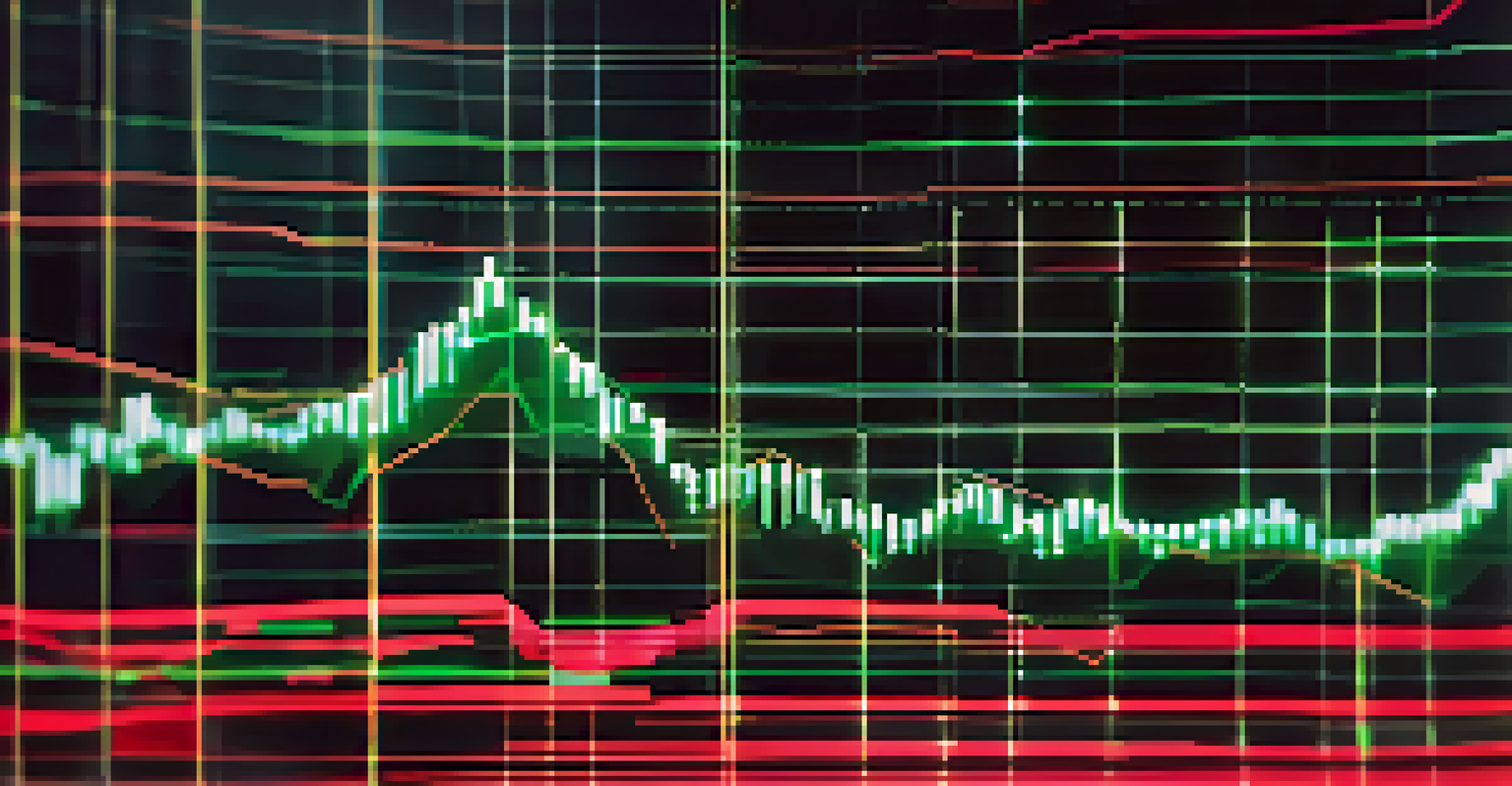The Impact of Political Events on Market Volatility

Political Events: A Catalyst for Market Reactions
Political events, such as elections or government policy changes, often trigger immediate reactions in financial markets. Investors tend to reassess their strategies based on perceived risks and uncertainties introduced by these events. For example, a surprise election result can lead to a surge or drop in stock prices as traders react to the potential implications for the economy.
In investing, what is comfortable is rarely profitable.
The unpredictability of political events can create a sense of urgency among investors, leading to increased market volatility. Think of it like a sudden storm; just as you might rush to secure your windows before the rain hits, investors scramble to adjust their portfolios to mitigate potential losses. This reaction can cause significant fluctuations in market indices.
Moreover, the anticipation of political events can be just as impactful as the events themselves. The lead-up to an election, for instance, often sees a build-up of speculation, causing markets to swing in response to polls and forecasts. This 'waiting game' adds another layer of complexity to market dynamics.
Historical Examples of Political Influence on Markets
History provides ample evidence of political events causing market volatility. Take the Brexit referendum in 2016, when the UK voted to leave the European Union. The immediate aftermath saw the British pound plummet, reflecting investor anxiety about the future economic relationship between the UK and Europe.

Similarly, the U.S. presidential elections often bring about significant market fluctuations. For instance, during the 2020 election, stock markets experienced wild swings as results came in, reflecting investor sentiment regarding the potential for changes in fiscal policy and regulation. Such examples illustrate how the uncertainty surrounding political outcomes can lead to erratic market behavior.
Political Events Drive Market Volatility
Political events like elections and policy changes can trigger swift reactions in financial markets, leading to significant fluctuations in investor sentiment.
These historical instances serve as reminders that markets are not solely driven by economic data; political sentiment plays a critical role. Investors must remain vigilant, keeping an eye on political developments and their potential ramifications for market conditions.
Understanding Market Sentiment During Political Unrest
Political unrest—such as protests, coups, or civil disturbances—can dramatically affect market sentiment. When a country faces instability, investors often perceive it as a heightened risk, prompting them to withdraw investments or seek safer assets. This flight to safety can exacerbate market volatility, as seen during the Arab Spring in 2011 when various Middle Eastern markets experienced significant downturns.
The stock market is filled with individuals who know the price of everything, but the value of nothing.
Investor sentiment is influenced not just by the events themselves but also by media coverage and public perception. For example, extensive media reporting on a political crisis can amplify fears and lead to panic selling, further destabilizing the market. This creates a feedback loop where negative sentiment feeds into market volatility.
Understanding this relationship between political events and market sentiment is crucial for investors. By recognizing how emotions can drive financial decisions, they can better navigate periods of uncertainty and potential volatility.
The Role of Government Policies in Market Stability
Government policies play a significant role in shaping market conditions. Tax reforms, trade agreements, and regulatory changes can either foster investor confidence or create a sense of unease. For instance, the introduction of tariffs may lead to concerns about trade wars, prompting investors to react accordingly and resulting in market fluctuations.
Moreover, the economic policies of a newly elected government can have long-term implications for market stability. If a government signals a shift towards more interventionist policies, it can cause markets to recalibrate their expectations for growth and profitability. Investors often analyze these signals closely to gauge potential impacts on their investments.
Global Impact of Local Politics
Political happenings in one country can ripple across the globe, affecting markets worldwide, particularly in interconnected economies.
In this way, government policies serve as both a stabilizing and destabilizing force in markets. It’s essential for investors to stay informed about policy changes and their possible consequences on market dynamics.
Global Political Events and Their Local Impact
In our interconnected world, political events in one country can have ripple effects across the globe. For instance, a significant election in a major economy, like the U.S. or China, can influence markets worldwide, as investors reassess risk and opportunity on a global scale. This interconnectedness can amplify market volatility beyond local borders.
Consider how the U.S.-China trade tensions affected not just American and Chinese markets, but also those of emerging economies reliant on trade with these giants. As tariffs were imposed and negotiations stalled, markets reacted with heightened volatility, showcasing the global implications of political decisions.
This phenomenon highlights the importance of understanding international relations and how they shape market conditions. Investors must consider not just domestic political events but also global dynamics that could impact their portfolios.
The Psychological Aspect of Political Events on Investors
The psychological impact of political events on investors cannot be understated. Fear and uncertainty often drive decision-making, leading to irrational behavior that can exacerbate market volatility. For example, during times of political upheaval, investors may overreact, pulling out of stocks and causing prices to plummet unnecessarily.
This behavior is linked to behavioral finance, which studies how psychological influences affect market outcomes. Investors often fall prey to biases such as loss aversion, where the fear of losing money overshadows the potential for gains, further contributing to market fluctuations in response to political events.
Investor Psychology Influences Decisions
The psychological effects of fear and uncertainty during political unrest can lead to irrational investment decisions, exacerbating market volatility.
Understanding these psychological factors can help investors make more rational decisions during turbulent times. By recognizing their own biases, they can navigate market volatility with a clearer mindset and a more strategic approach.
Strategies for Navigating Market Volatility Amid Political Events
Navigating market volatility requires a well-thought-out strategy, especially during political events. One effective approach is diversification, which spreads risk across various asset classes, reducing the impact of adverse market movements. By holding a mix of stocks, bonds, and other investments, you can cushion your portfolio against sudden downturns caused by political uncertainty.
Additionally, staying informed and keeping an eye on political developments can empower investors to make proactive decisions. Regularly reviewing news and analysis helps you anticipate potential market shifts, allowing you to adjust your investment strategy as needed. This proactive approach can make a significant difference in managing market volatility.

Lastly, maintaining a long-term perspective is crucial. While political events may cause short-term fluctuations, focusing on your overall investment goals can help you weather the storm. Remember, markets are cyclical, and what may seem like a crisis today could be an opportunity for growth tomorrow.